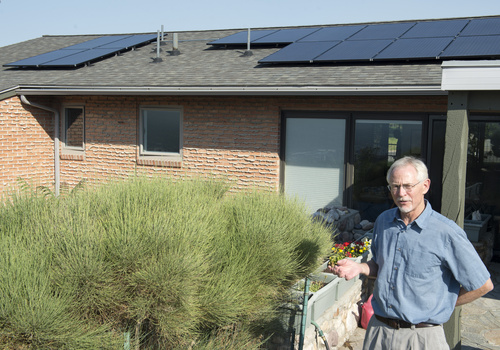This is an archived article that was published on sltrib.com in 2014, and information in the article may be outdated. It is provided only for personal research purposes and may not be reprinted.
Utahns with rooftop solar panels won't face a new fee from Rocky Mountain Power after the Utah Public Service Commission ruled Friday that the utility company failed to prove such a charge is "just and reasonable."
But this contentious debate pitting the state's largest electric company against environmental groups isn't going away. The Commission is open to revisiting the issue as long as Rocky Mountain Power can provide some hard data proving these customers should be treated differently than others who just use less energy than the average family.
Renewable energy advocates hailed the ruling as a major victory.
"What a bright day for Utah's future," said Sarah Wright, executive director of Utah Clean Energy. "This order protects energy choice in Utah, and recognizes the potential solar has to benefit all Utahns."
Rocky Mountain Power framed the ruling as a minor setback in on an issue that's far from being settled.
"It is a little disappointing that the commission did not take at least an interim step," said Dave Eskelsen, a spokesman for the power company. "We understand that emotions are running high. We look forward to participating in the accumulation of more information."
This high-profile fight has far more to do with Utah's energy future than the dollars and cents at stake today. Rocky Mountain Power wanted to levy a $4.65 per month fee for "net meter" customers, a group of early solar adopters who number about 2,700. If the fee was implemented, it would raise just $150,000 the first year.
At the same time, the commission did approve a small rate increase for all residential customers that is expected to net the company $35 million in the next year. That 1.9 percent rate increase, which goes into effect on Monday, means the average energy bill will go up $1.76 per month. The commission also approved another general rate increase for Sept. 2015 that would add another 73 cents per month to the average bill.
Nevertheless, the number of homes with solar panels is growing and Rocky Mountain Power argued in a contentious two-day hearing last month that these customers are not paying their fair share of the utility's fixed costs to maintain the power system. Eskelsen said that fixed costs could be as high as $30 per month and that the proposed fee was only $4.65 because that was in line with what the Utah Division of Public Utilities and the Office of Consumer Services, both government entities, would support.
Groups including HEAL Utah and the Alliance for Solar Choice questioned Rocky Mountain's motives, suggesting the power company is trying to dissuade people from going solar to protect its business model and that utilities are using the state as a test case.
"It's a victory for clean air and clean energy, and a strong rebuke to Rocky Mountain Power, who once again showed themselves to be more concerned about protecting their dirty energy monopoly than the health and well-being of Utah's families," said Christopher Thomas, executive director of HEAL Utah.
For Bryan Miller, Friday's ruling was not so much a victory for the environment as for property rights and consumer choice.
"This is by no means over. We applaud the commission for taking the reasonable step of having a transparent discussion," Miller said. "The commission concluded doing a thoughtful cost-benefit study was the right approach. Transparency is the interest of all ratepayers."
Eskelsen said the conspiracy accusations are "overreaching" and said the company's only motive was "to make sure that rates cover the costs of providing service."
Net metered customers bank credit for the excess power they generate and pump into the grid, then redeem the credit at those times of day when their solar panels can't meet their electrical needs.



